Slack vs Basecamp: Which Tool is Best for Team Communication & Project Management?

When considering modern collaboration tools, Slack vs Basecamp is a common debate. These two platforms serve different purposes: Slack is all about real-time messaging and integration-heavy workflows, while Basecamp takes a more holistic and asynchronous approach to managing work and communication.
In this guide, we compare both tools in detail—covering messaging, tasks, pricing, integrations, and use cases—to help you choose the best one for your team. If your team relies on time tracking, using a Basecamp time tracking integration can enhance productivity and keep projects on schedule.
💬 What is Slack?
Slack is a real-time messaging and collaboration tool built for modern work environments. It’s widely used by tech teams, startups, and remote companies that value fast, responsive communication, robust integrations, and channel-based collaboration.
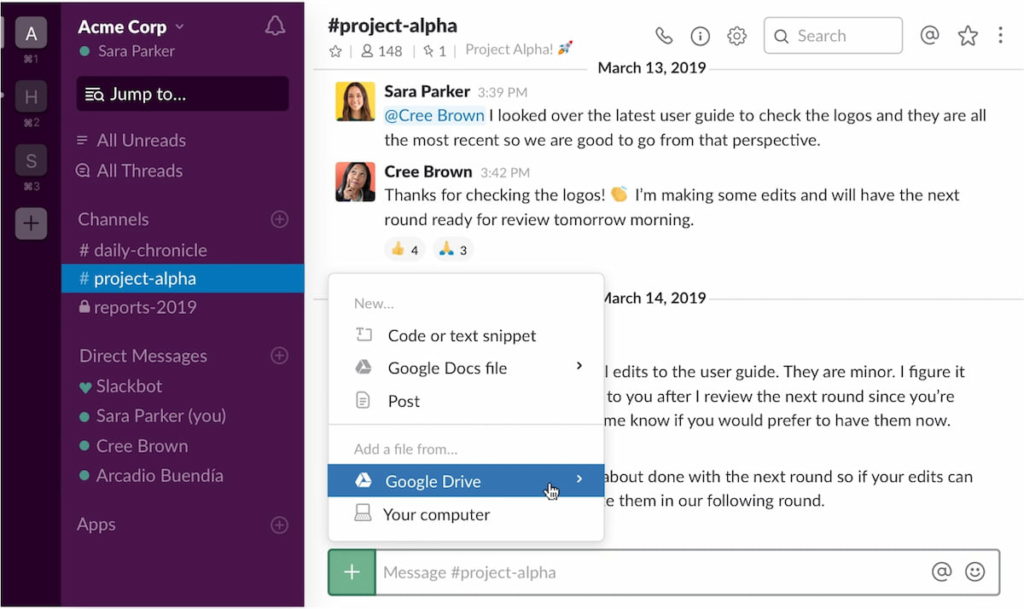
📦 What is Basecamp?
Basecamp is an all-in-one collaboration platform built to help teams stay aligned without constant meetings or chaos. It combines task tracking, document sharing, group messaging, and schedules in one clean interface—with a strong focus on asynchronous work.
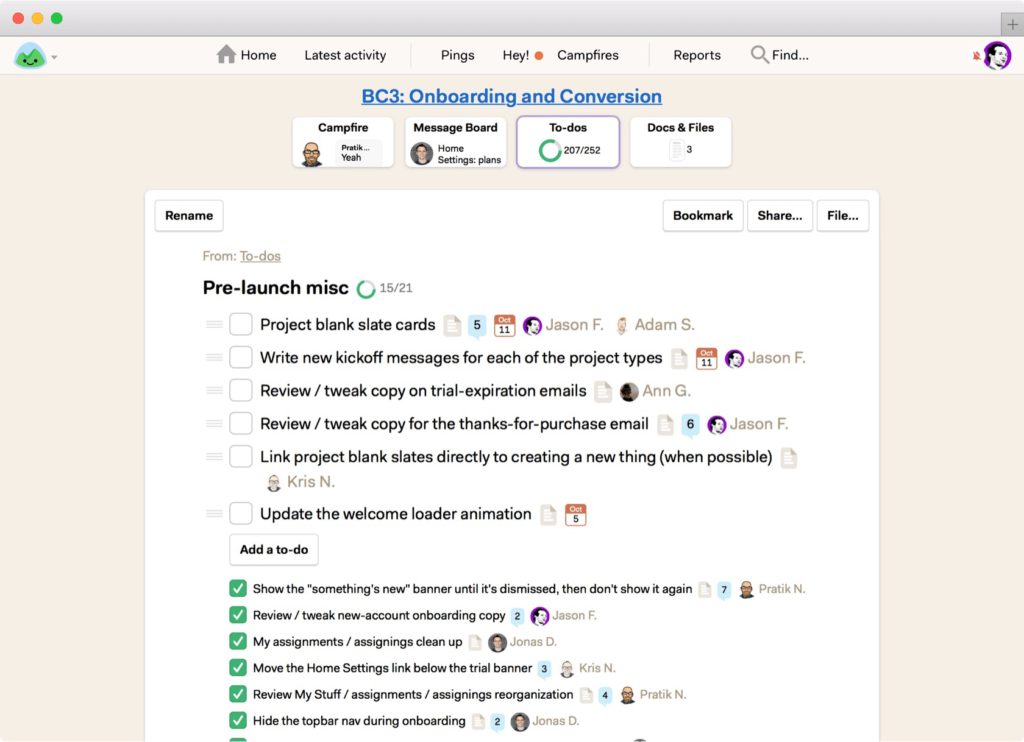
⚖️ Slack vs Basecamp: Quick Comparison Table
| Feature | Slack | Basecamp |
|---|---|---|
| Main Focus | Real-time chat & integrations | Asynchronous team coordination |
| Task Management | Requires integration (e.g., Asana) | Built-in to-do lists & Hill Charts |
| Communication | Channels, threads, DMs | Campfire chat, Message Boards |
| UI Complexity | High (more customizable) | Simple & clean |
| Pricing | $8.75–$15/user/month | $15/user/month or $299/team flat |
| Free Plan | ✅ Yes | ❌ No (30-day trial only) |
| File Storage | 5–10GB/user | 100GB/team |
🧠 Core Features Comparison
| Feature | Slack | Basecamp |
|---|---|---|
| Channel-based chat | ✅ Yes | ❌ No |
| File sharing + search | ✅ Yes | ✅ Yes |
| Third-party task tools (Asana, Trello) | ✅ Yes | ❌ No |
| Voice/video calls | ✅ Yes | ❌ No |
| Workflow builder | ✅ Yes | ❌ No |
| Emoji & reactions | ✅ Yes | ❌ No |
| Message Boards for updates | ❌ No | ✅ Yes |
| Campfire for casual chat | ❌ No | ✅ Yes |
| Built-in task management (To-Dos) | ❌ No (Requires integrations) | ✅ Yes |
| Hill Charts for progress tracking | ❌ No | ✅ Yes |
| Schedule, Docs, and File storage | ❌ No | ✅ Yes |
| Check-in questions (automated async status) | ❌ No | ✅ Yes |
💻 User Interface & UX
- Slack: More complex, customizable with a modern aesthetic. New users may need onboarding.
- Basecamp: Clutter-free UI, minimal distractions, fewer clicks to perform tasks.
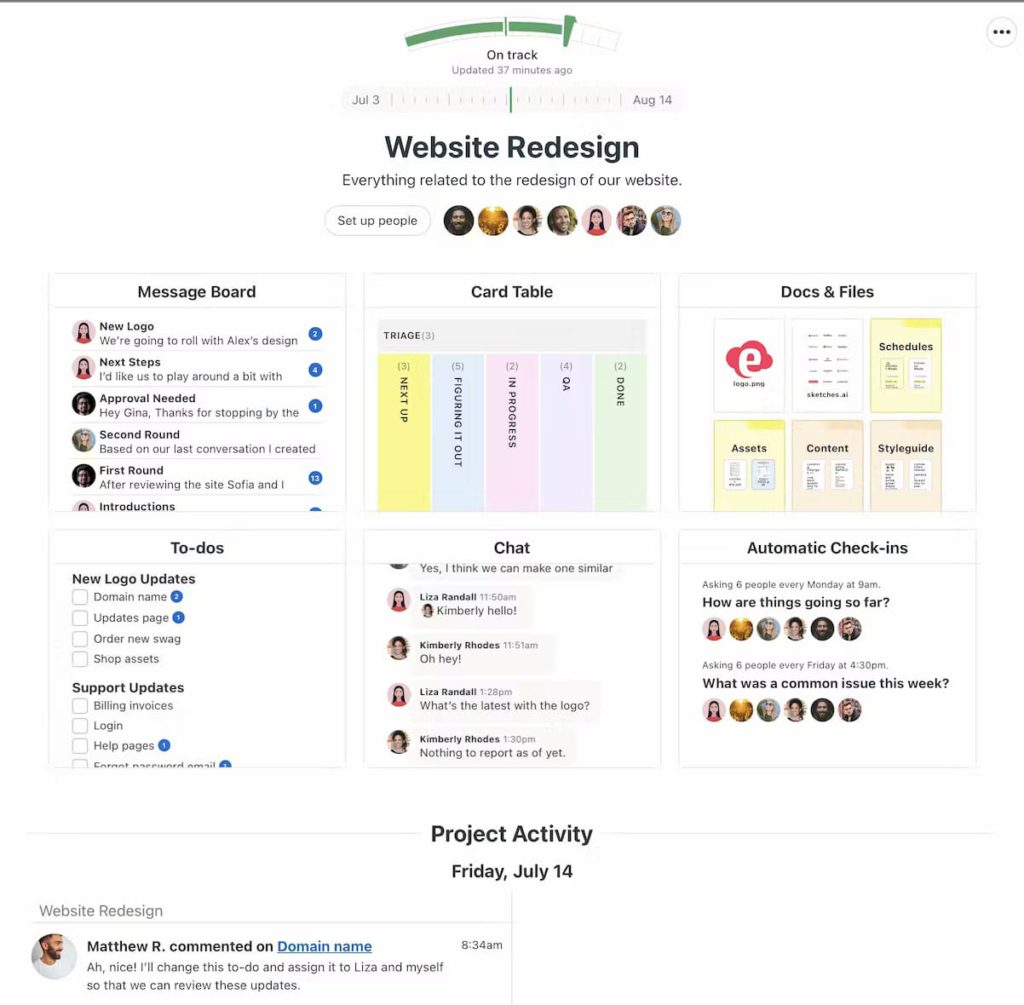
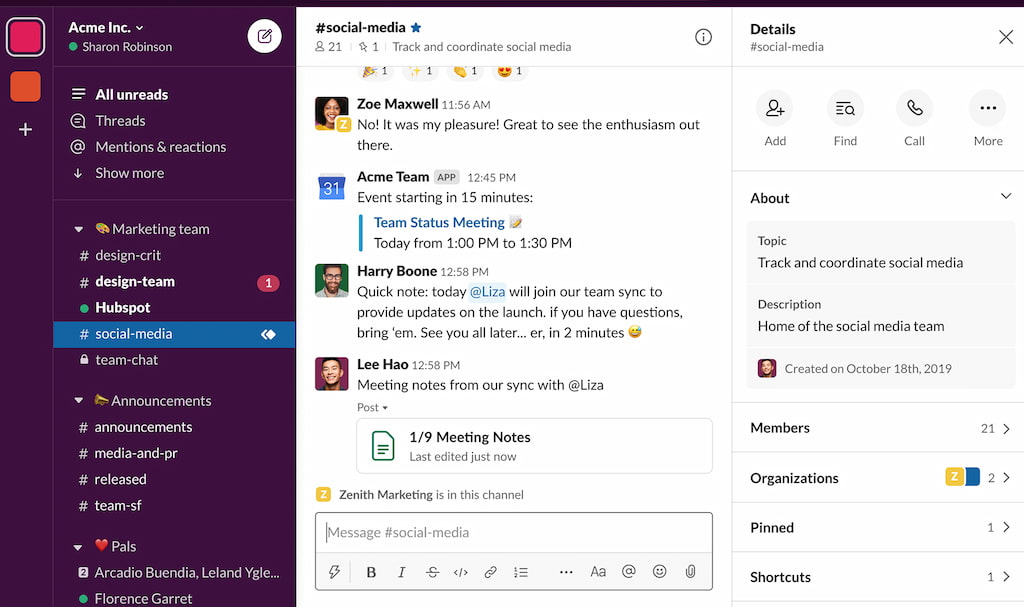
📥 Communication & Team Chat
- Slack shines in real-time interaction, quick updates, and back-and-forth convos. It also supports emojis, GIFs, polls, and voice/video.
- Basecamp, on the other hand, leans toward structured communication—message boards are used for updates and announcements, while Campfire is the casual group chat.
🔍 “Basecamp is a project management tool, Slack is more of a collaboration tool. You can integrate other various project management tools with Slack, such as Asana and Trello. I think of Slack as more of an entire productivity ecosystem, rather than single application because you can use it for a number of different purposes. Basecamp, on the other hand, is a dedicated project management tool with more limitations.” [Jeremy Yancey, Quora]
🔍 “Slack is fine for adhoc communication but I wouldn’t run a project on it. It does keep all conversations/assets in one place but it’s like finding something in a WhatsApp group! Email is good for getting official agreement but not for discussion about work or assets. It’s exactly like trying to find something in your email. Bad. I think you want something more project management focused like Basecamp.” [DearAgencyFounder, Reddit]
🛠️ Task & Project Management
- Slack: Not native—requires task tools (Asana, ClickUp, Notion).
- Basecamp: Fully integrated task system with to-do lists, assignments, due dates, and visual progress.
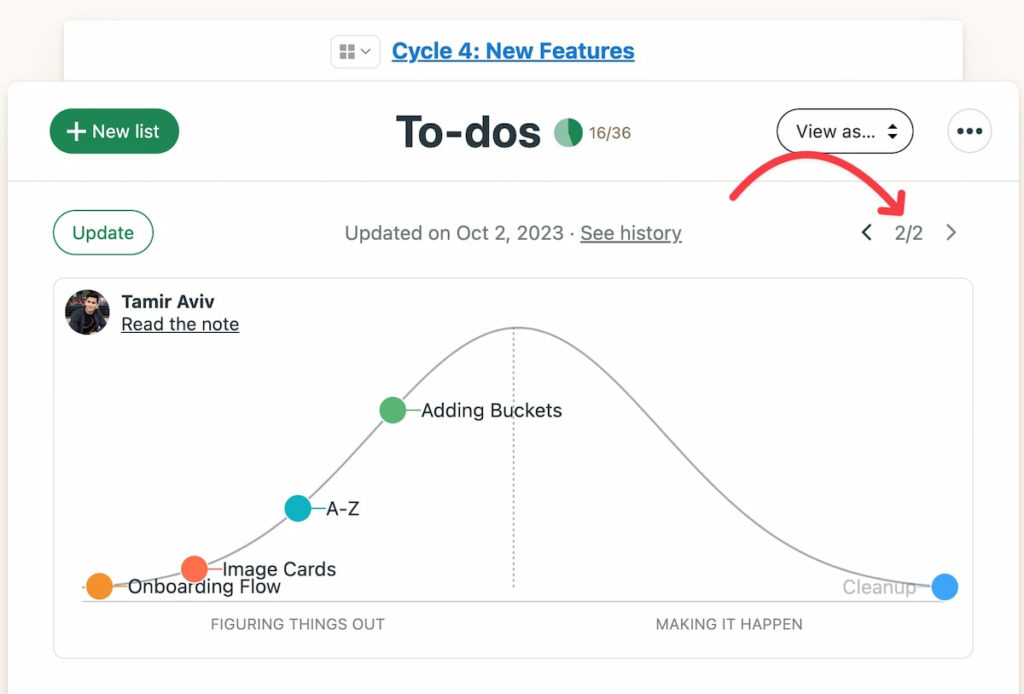
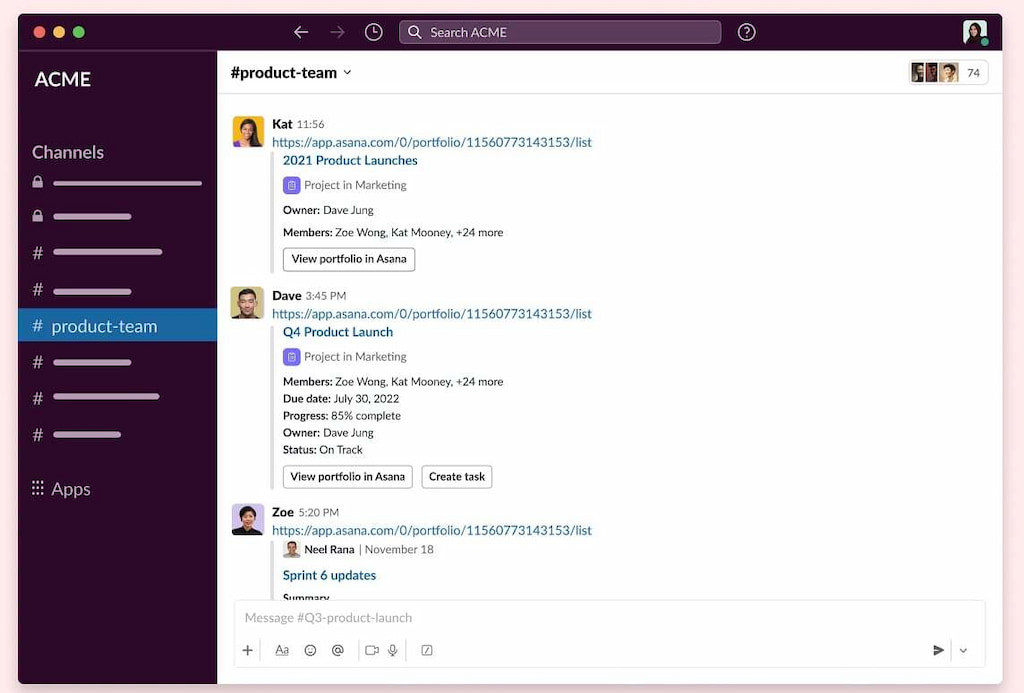
🔌 Integrations & Ecosystem
Slack integrations (3000+):
- ✅ Everhour
- Notion
- Zoom
- Google Drive
- Jira
- Trello
- GitHub
- ✅ Everhour
- Zapier
- Google Workspace
- Dropbox
- Slack (Yes, ironically!)
- Automate.io
📊 Productivity & Workflow Tools
- Slack: Custom workflows, reminders, and automation via Workflow Builder
- Basecamp: Automated check-ins, Hill Charts, project summaries
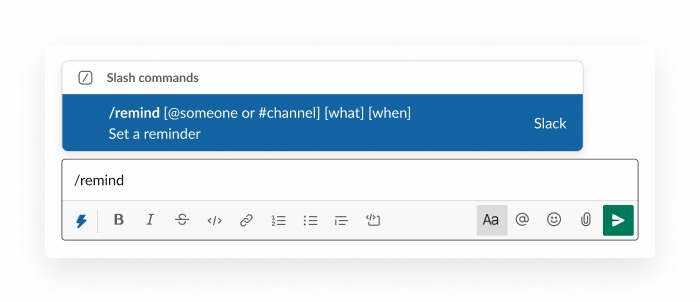
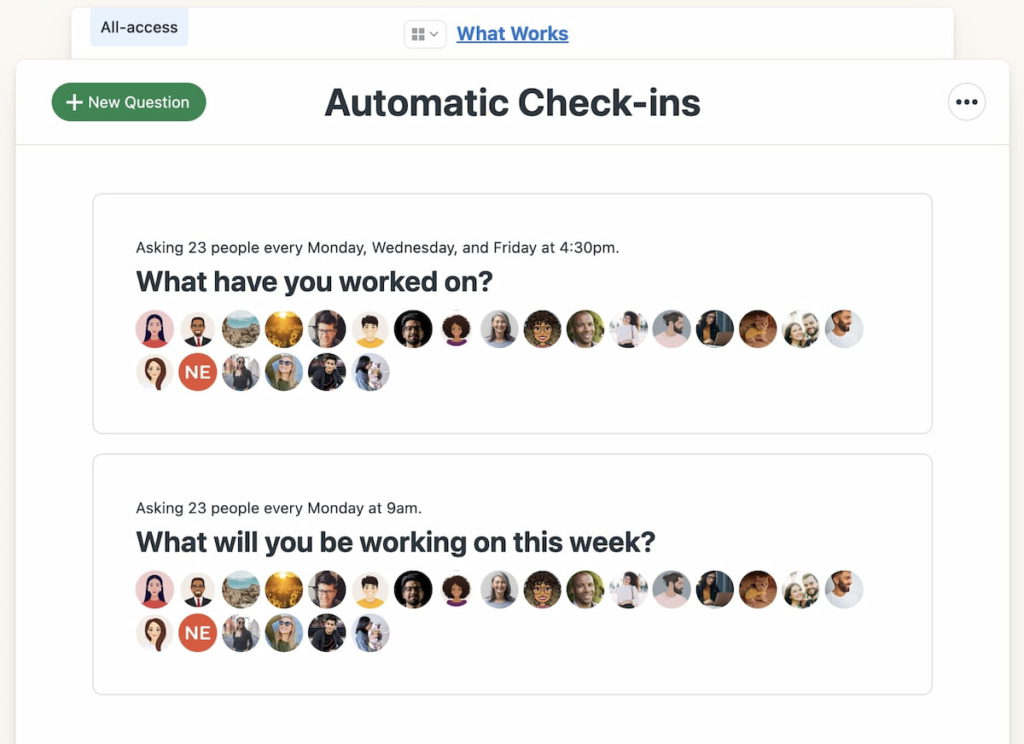
💰 Pricing Plans Breakdown
| Plan | Slack | Basecamp |
|---|---|---|
| Free | Yes (90-day message history) | Yes (one project) |
| Standard / Plus | $8.75/user/month | $15/user/month |
| Pro / Pro Unlimited | $15/user/month | $299/month flat for unlimited users |
| Enterprise | Custom | ❌ |
💬 Note: For large teams, Basecamp’s flat pricing often wins.
📉 Reporting & Insights
- Slack: Activity insights via analytics dashboard (Pro/Enterprise)
- Basecamp: Lacks detailed reporting but you can export task progress manually
🌟 Note: For deeper reporting, consider tools like Everhour or TimeCamp.
👥 Real User Reviews & Experiences
Basecamp reviews
Ellie H., Graphic Designer, G2: “Basecamp came as a solution that I didn’t know we needed until we implemented it. The first thing that caught my eye was its design: clean, visual, and very easy to understand. The whiteboards are great; it allowed us to organize everything at a glance, and we were able to customize them as we wanted. Automation takes things to a new level: tasks that once took hours to complete now resolve themselves. And I can’t help but mention how it integrates with Slack and other utility tools. (…) Although it has been great and error-free, when we work on very large projects with many real-time updates, sometimes you notice that the platform slows down a bit. It hasn’t slowed us down, but optimizing it for those cases would be ideal.”
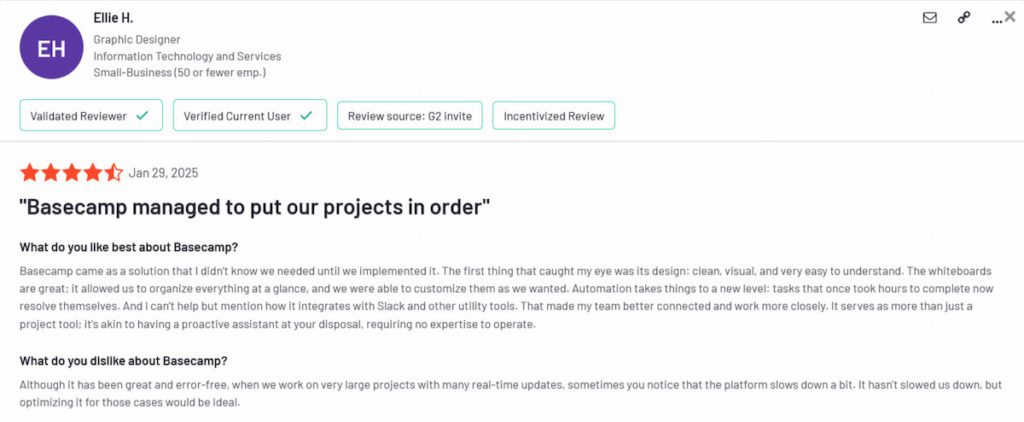
Kalpesh Patel, Quora: “Basecamp is oriented more towards project management where you are building your communication around project/tasks and tracking projects/tasks. Slack on the other hand seems more like an enterprise communication log/archive and a place that brings all communication in disparate systems to one common ground, this way you just need to go to one place to find status about anything and everything. It is one place to talk about everything in a company. You can compare Asana as a competitor to Basecamp and hipchat as a competitor to Slack. In short you cant just use Slack to replace Basecamp and you can’t use just Basecamp to do what Slack provides.“
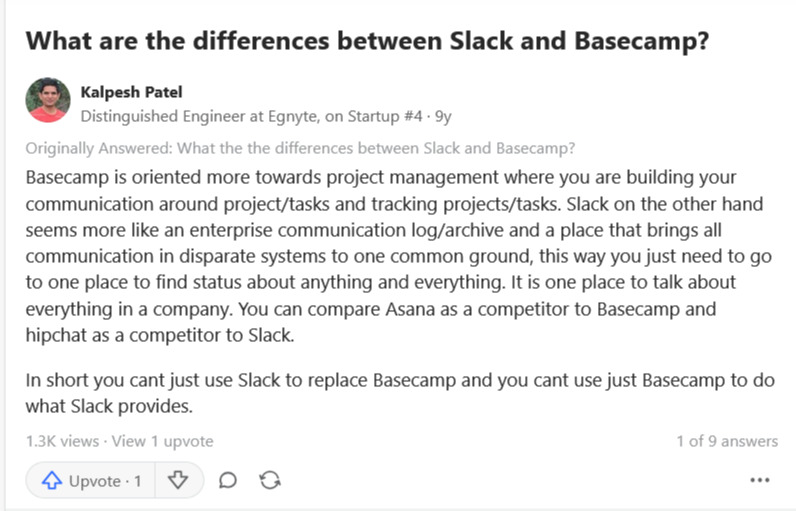
Slack reviews
Alex B., Managing Director, Capterra: “We are a predominantly remote business now, and what stands out most about Slack is its ability to centralize communication in a way that makes teamwork seamless. The channels allow for organized discussions around specific topics, and the integration with other tools makes it easy to streamline workflows. It makes collaboration feel more dynamic because you can react to messages, share updates in real-time, and even automate some tasks to save time. One of the things I like least about Slack is the potential for information overload. With so many channels, threads, and messages, it can sometimes feel overwhelming to keep up with everything, especially if you’re part of a large team or working on multiple projects at once.”
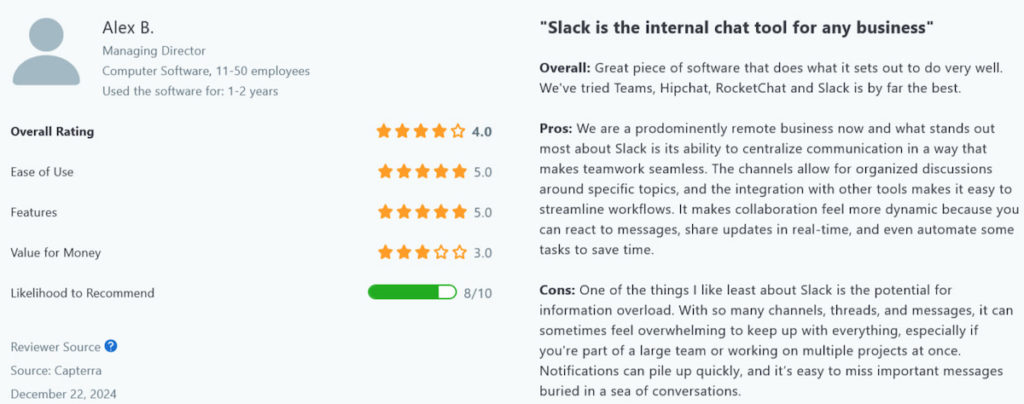
billymcnilly, Reddit: “I worked for a fully remote company. Slack’s search was the saviour of my experience. It’s powerful when just entering a simple string, but also has a plethora of advanced options. Being able to search across all public/open channels is the single biggest feature, and the lack of that in Teams makes the whole company suddenly feel very closed off. Even when I was in the right channel, and I knew the desired information was in that channel, I had a lot of trouble finding it with teams search. I don’t want to be a member of every channel, but when I have a deploy error I will always plug it into search, and often find another team in our org that is having the same problem.”
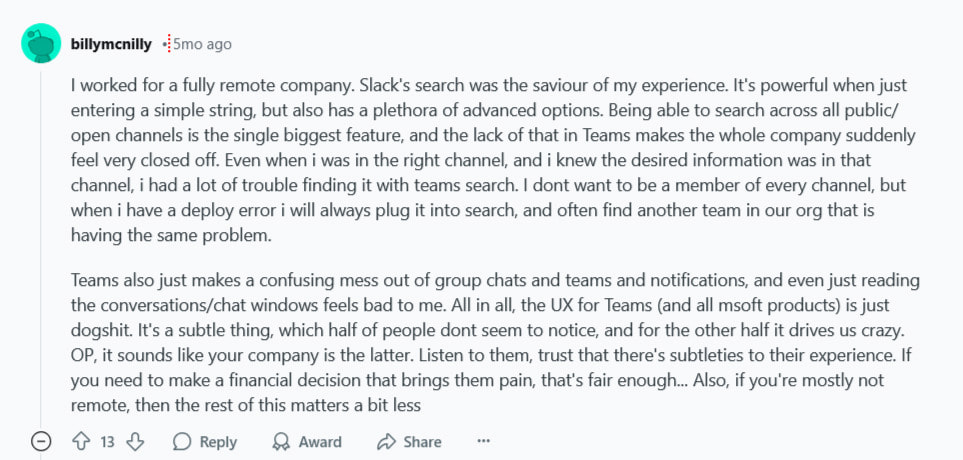
✅ Pros & Cons
| Feature | Slack | Basecamp |
|---|---|---|
| Pros ✅ |
Excellent for real-time chat Thousands of integrations Advanced workflows Free plan available |
Simplicity & built-in structure One price for big teams Encourages async work Task + communication hub |
| Cons ❌ |
Message overload No native task manager Pricing increases with team size |
No native video or voice Fewer third-party integrations No forever free plan |
🎯 Use Cases: Who Should Use What?
Choose Slack if you:
- Rely on real-time communication
- Want deep app integrations
- Already use tools like Jira, GitHub, and Notion
Choose Basecamp if you:
- Need structured project management
- Prefer async workflows
- Have a team that is medium to large and wants flat pricing
❓ FAQs: Slack vs Basecamp
Can you manage projects in Slack?
Only with third-party apps like Asana, ClickUp, or Trello.
Does Basecamp have live chat like Slack?
Not exactly—Campfire is basic, and there’s no video/audio built-in.
Is Slack or Basecamp better for remote teams?
Depends—Slack is great for real-time work; Basecamp is ideal for async teams.
Can I track time in either tool?
Yes, using Everhour. It integrates natively with both.
🏁 Final Verdict: Slack vs Basecamp
🏆 Best for chat-driven teams → Slack
🏆 Best for structured project management → Basecamp
Whether your team thrives on fast-paced chat or focused, organized work, one of these platforms will fit your workflow perfectly.
Use Everhour’s time tracker and timesheet app to make sure not a single minute of your work goes unreported! Also, don’t forget that Everhour for Slack integration is also out there!
🚀 In case you’re looking for a tool that can take care of Basecamp time tracking and more, check out Everhour and what real users have to say about it:
“Everhour is the best time tracking tool for use with Basecamp. In the past, we have used Toggl and Tick and while they did integrate with Basecamp, it wasn’t as seamless as it is with Everhour.” [Kory, Capterra]
“Since we started using Everhour we began to understand the time involved in our project, not the estimated time but the ACTUAL time, which is a lot, because now we know when the fee is not adjusted to the real dedication. It also helped every team member to understand how to make their shifts more efficient.” [María Lucía S., Capterra]
“Everhour is user-friendly and works well inside Basecamp. As a project manager, it makes budgeting our project hours easy to manage.” [Jamie, G2]
